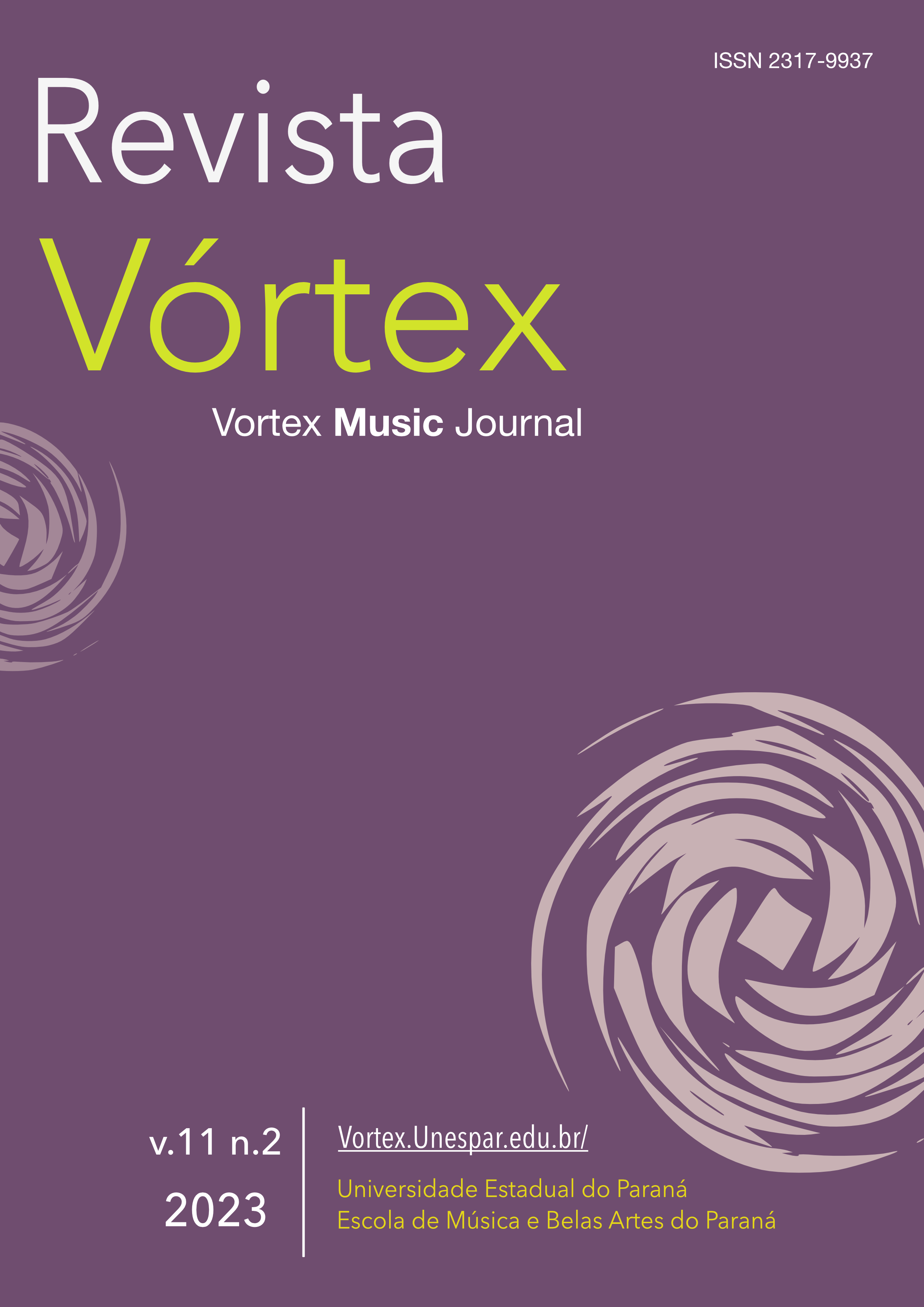Performer openness strategies and the discourse control procedures
DOI:
https://doi.org/10.33871/23179937.2023.11.2.7496Keywords:
Performer-composer, Power relations, Discourse control procedures, Paulo de Assis, Critical analysisAbstract
This article proposes a critical analysis of the composer/performer relationship based on the ‘emancipated performer’ by Paulo de Assis. The power mechanisms related to division of roles will be historically situated through Michel Foucault’s conceptions of discipline and sovereignty. Subsequently, we analyzed the methodological and artistic propositions based on the conception of Musical Work conceived by Assis. In order to understand the limits and contradictions of Assis approach, we draw parallels between the author’s approach and the discourse control procedures. We believe that such analytical allows us to understand the ordering, delimitation and exclusion mechanisms associated with discursive formations based on the composer/performer relationship.
Downloads
References
ASSIS, Paulo de. Logic of Experimentation: Rethinking Music Performance through Artistic Research. Ghent: Orpheus Institute, 2018a.
______________. (Intérpretes: ME21 Collective). Diabelli Machines8: after Ludwig van Beethoven’s Diabelli Variations, op.120. Ghent: Orpheus Institute, 2018b. 1 CD (63:03 min) e 1 DVD (87:00 min). Encarte em digital. Disponível em: <https://www.academia.edu/37373201/Diabelli_Machines_8_CD_and_DVD_>.
ATTALI, Jacques. Noise: the political economy of music. Minneapolis: University of Minnesota Press, 2009.
CARDASSI, Luciane. Time and Place within a performer-composer collaboration. In: MENDES, Jean Joubert Freitas. NODA, Luciana (Org.). Ensaios sobre a música do século XX e XXI: composição, performance e projetos colaborativos. Universidade Federal do Rio Grande do Norte: EDUFRN, 2016, p. 76-100.
_________________. Shared musical creativity: teaching composer-performer collaboration. Vórtex, Curitiba, v. 8, n. 1, p. 1-19, 2020.
CASTRO, Edgardo. Vocabulário de Foucault: um percurso pelos seus temas, conceitos e autores. Belo Horizonte: Autêntica Editora, 2009.
CLARKE, Eric Fillenz; DOFFMAN, Mark. Distributed Creativity: Collaboration and Improvisation in Contemporary music. New York: Oxford University Press, 2017.
D’ERRICO, Lúcia. Powers of Divergence: an experimental approach to music performance. Ghent: Orpheus Institute, 2018.
DELEUZE, Gilles. Foucault. São Paulo: Brasiliense, 2013.
DOMENICI, Catarina. It takes two to tango: a prática colaborativa na música contemporânea. Revista do Conservatório de Música da UFPel, Pelotas, n. 6, p. 1-14, 2013.
DREYFUS, Laurence. Beyond the Interpretation of Music. Journal of Musicological Research, v.39, p. 1-26, 2020.
FOUCAULT, Michel. A arqueologia do saber. Tradução de Luiz Felipe Baeta Neves. 7° ed. Rio de Janeiro: Forense Universitária, 2005a.
_________________. Em defesa da sociedade. Curso no Collège de France (1975-1976). São Paulo: Martins Fontes, 2005b.
________________. O poder psiquiátrico. Curso no Collège de France (1973-1974). São Paulo: Martins Fontes, 2006a.
_________________. Poder-Saber. In: MOTTA, Manuel B. (Org). Ditos & Escritos IV: Estratégia, Poder-Saber. 2° ed. Rio de Janeiro: Forense Universitária, 2006b, p. 223-240.
_________________. A ordem do discurso. Aula inaugural no Collège de France, pronunciada em 2 de dezembro de 1970. 24° ed. São Paulo: Edições Loyola, 2014.
_________________. História da loucura na idade clássica. 11° ed. São Paulo: Perspectiva, 2017.
GOEHR, Lydia. The Imaginary Museum of Musical Works: an Essay in the Philosophy of music. Oxford: Clarendon Press, 1992.
____________. The Perfect Performance of Music and The Perfect Musical Performance. New Formation: performance matters, v. 27, p. 1-22, 1995.
GOOLEY, Dana. The Battle against Instrumental Virtuosity in the Early Nineteenth Century. In: GOOLEY, Dana; GIBBS, Christopher H. (ed.). Franz Liszt and His World. Princeton: Princeton University Press, 2006, p. 75-111.
HAYDEN, Sam; WINDSOR, Luke. Collaboration and the composer: case studies from the end of the 20th century. Tempo. Cambridge, v. 61, n. 240, p. 28-39, 2007.
LEISTRA-JONES, Karen. Staging Authenticity: Joachim, Brahms, and the Politics of Werktreue performance. Journal of the American Musicological Society, v. 66, n. 2, p. 397-436, 2013.
MOORE, Robin. The Decline of Improvisation in Western Art Music: As interpretation of Change. International Review of the Aesthetics and Sociology of Music, v. 23, n. 1, p. 61-84, 1992.
NYMAN, Michael. Experimental Music: Cage and Beyond. 2° ed. Cambridge University Press, 1981.
PIOTROWSKA, Anna G. Expressing the Inexpressible: The Issue of Improvisation and the European Fascination with Gypsy Music in the 19th Century. International Review of the Aesthetics and Sociology of Music, v. 43, n. 2, p.325-341, 2012.
PRITCHETT, James. The music of John Cage. Cambridge University Press, 1996.
TAYLOR, Alan. ‘Collaboration’ in Contemporary Music: A Theoretical View. Contemporary Music Review, v. 35, p.1-17, 2017.
WHITTALL, Arnold. Composer-performer collaborations in the long twentieth century. In: CLARKE, E. DOFFMAN, M. (Org). Distributed Creativity: Collaboration and Improvisation in Contemporary music. New York: Oxford University Press, 2017, p.21-36.
Downloads
Published
How to Cite
Issue
Section
License
Copyright (c) 2023 Daniel Pizaia, Fabio Furlanete

This work is licensed under a Creative Commons Attribution 4.0 International License.
Autores mantêm os direitos autorais e concedem à revista o direito de primeira publicação, com o trabalho simultaneamente licenciado sob a Licença Creative Commons Attribution que permite o compartilhamento do trabalho com reconhecimento da autoria e publicação inicial nesta revista.






